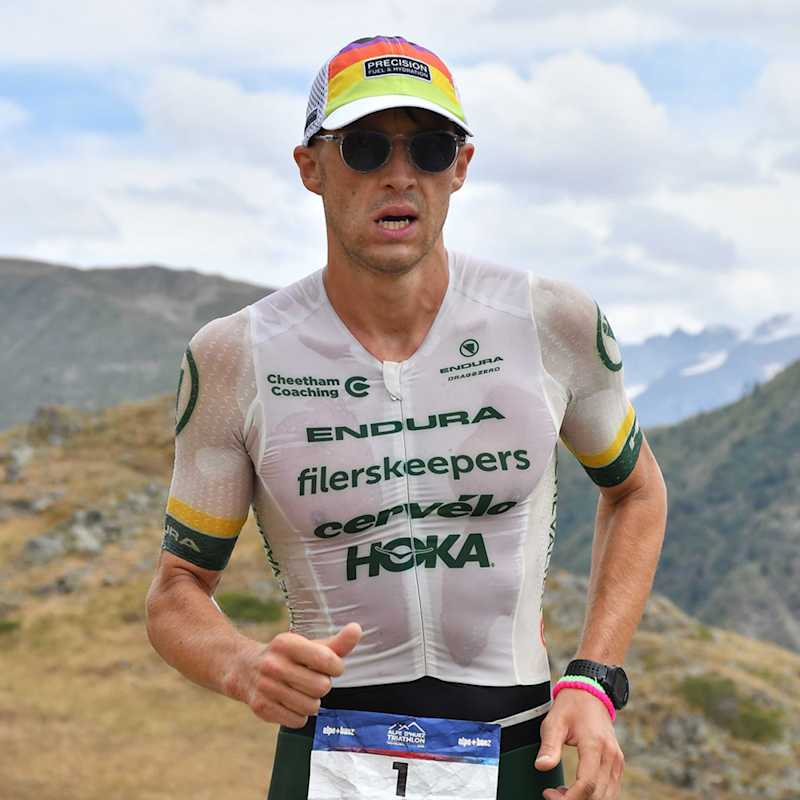
Leon Chevalier
IRONMAN® South Africa
Leon's headline numbers
Leon's strategy
Fueling
Carbohydrate is the main fuel you burn when racing. Failing to fuel properly is a leading cause of underperformance in longer races.
As is the norm for Leon, he carried all of his fuel on the bike from the start by squeezing a PF 90 Gel into each of his three bottles and carrying an additional two PF 30 Gels and two PF 30 Caffeine Gels in his bento box. Alongside this, Leon carried and ate his traditional chocolate bar, which he says just gives him a bit of satisfaction to eat, and breaks up eight hours of eating sports products! In all, this meant he averaged ~124g of carb per hour, which is an impressive feat, further supporting the emerging science suggesting highly trained athletes can tolerate carbohydrate intakes in excess of 100g per hour without issue. Whilst on the run, Leon carried a further eight gels. This Instagram post perfectly illustrates how he managed to carry them all in his trisuit, which is a neat way to store his fuel without having his hands full.
Hydration
Taking on board an appropriate amount of fluid and sodium is essential to maintaining blood volume and supporting the cardiovascular effort needed to perform on race day.
Whilst the absolute amount of sodium and fluid consumed per hour is important, it’s critical to consider these in relation to each other. This is known as 'relative sodium concentration' and it’s expressed in milligrams per litre (mg/L). How much sodium you’re taking in per litre of fluid is more important than the absolute amount taken in per hour.
Sweat sodium concentration (mg/L) is largely genetically determined and remains relatively stable. Knowing how salty your sweat is enables you to replace a good proportion of your sweat losses, which can range from 200-2,000mg/L.
Given Leon’s losses are High (1,392mg/L), nailing his hydration strategy becomes especially crucial when it’s hot and/or humid.
Learn moreDuring the race it was business as usual for Leon from a hydration standpoint, as he carried all of his electrolytes in premixed bottles, and diluted the concentration with ~800ml of plain water from the on-course aid stations. Super concentrated bottles of PH 1500 are something tht Leon’s practised using a lot, meaning his stomach is comfortable tolerating this rich beverage even before it’s diluted in his stomach. Leon also poured large amounts of water over his head during the run to reduce his perception of heat in the hot and very humid conditions. He also managed to drink a little over ~1.1L per hour via the on-course ‘water pouches’ from the aid stations, which he said “made it much easier to drink larger amounts than the usual cups of water”. Leon’s sodium intake fell significantly on the run compared to the bike, as he only had one Electrolyte Capsule on his way to a 2:47 marathon split. Leon may consider being more consistent with his sodium intake across future races in similar conditions considering his high sweat sodium concentration.
Caffeine
Beyond the Three Levers of Performance (carb, sodium and fluid), caffeine is one of only a few substances that is proven to improve performance for most endurance athletes as it can help stave off mental and physical fatigue.
Leon attempted to take a PF 30 Caffeine Gel around 10 minutes before the swim start, but as the start was delayed, this ended up being ~40 minutes before he dived into the water. Whilst this timing was not thought to be optimal for peaking his blood glucose ready to perform, it will still have provided him with a decent caloric and caffeine hit. The caffeine will likely have been peaking in his bloodstream early on in the swim, and provided him with the associated ergogenic benefits. During the race, Leon’s caffeine intake sat well within the scientific recommendations, and he felt it significantly reduced his perception of effort in the final kilometres.
How Leon hit his numbers
Here's everything that Leon ate and drank on the day...
Leon's weapons of choice
Final thoughts
Leon's full stats
Data Confidence?
There is an adequate level of accuracy in the data collected and the numbers reported. The athlete manages to recall what they ate and drank including most specifics (brands flavours quantities plausible estimations of volumes). However there are estimations made within the data which affect the overall confidence level in the data reported.